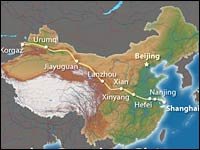Movies are an international business, but sometimes they get lost in translation.
I recently asked some freshmen to name their favorite English-language film, and one of them said, “Escape from Tehran.’’ Although I used to be a movie critic, I didn’t recognize the title. I tried to get the student to describe the story, but she couldn’t do it with her limited English.
After class, however, she came up to me and said, “I’m sorry to give you wrong name. I mean `Argo.’’’ The student had done some Internet research on her cell phone and found the English title. Apparently the film was called “Escape from Tehran’’ in China.
I encountered a similar situation when another student told me she liked a film called “Eva and Wally.’’ Turns out she was talking about the wonderful animated movie “Wall-E,’’ where the main characters are robots named EVE and WALL-E.
***
Counting in Chinese is as simple as 1-2-3.
Once you learn the Chinese way to say the numbers 1 through 10, counting to 100 is relatively easy.
Instead of having different words like eleven, twelve and thirteen, all you have to do is combine numbers when you go above 10. For instance, to say 11, you just use the word for 10, followed by the word for 1. For 15, you say the words for 10 and 5. Everything after that is a multiple of 10. So 2 and 10 means 20, and 21 combines the words for 2, 10 and 1.
I hope this will help me when I play craps in Macau.
***
Chinese students know a lot of English idioms and clichés. However, they don’t always get the words (or spelling) straight.
One freshman tried to tell my colleague Jennifer that she wanted to broaden her horizons. Instead, she wrote: “I want to go abroad in the future. In foreign country, I can learn more and horizen my eyeside.’’





I love your blog. Sounds like you are really enjoying your students and experiences! And I LOVE how they count. Might try that here. xo
Hey Rick, Love the blog and especially the on-the-ground detail. My facility in French always came a cropper with stuff like veingt-trois. Kudos to Chinese counting.